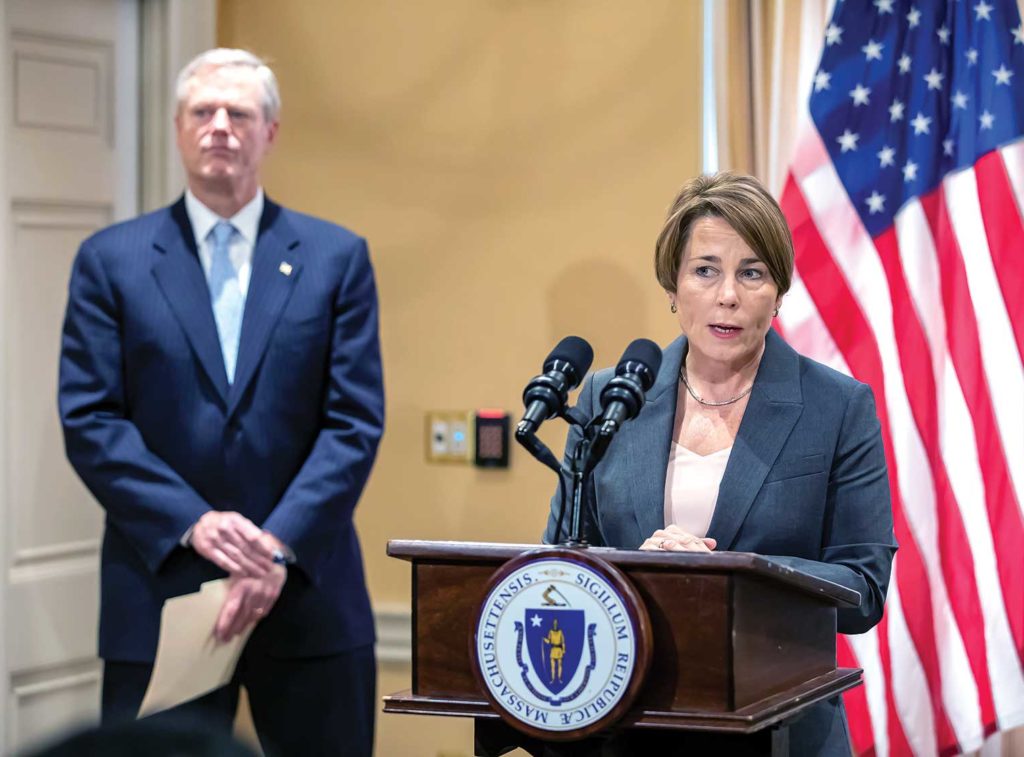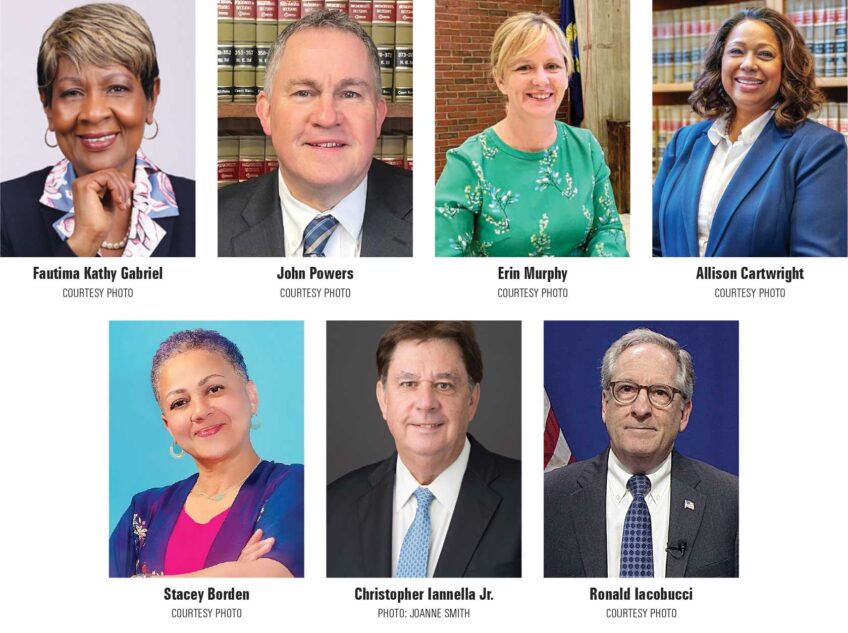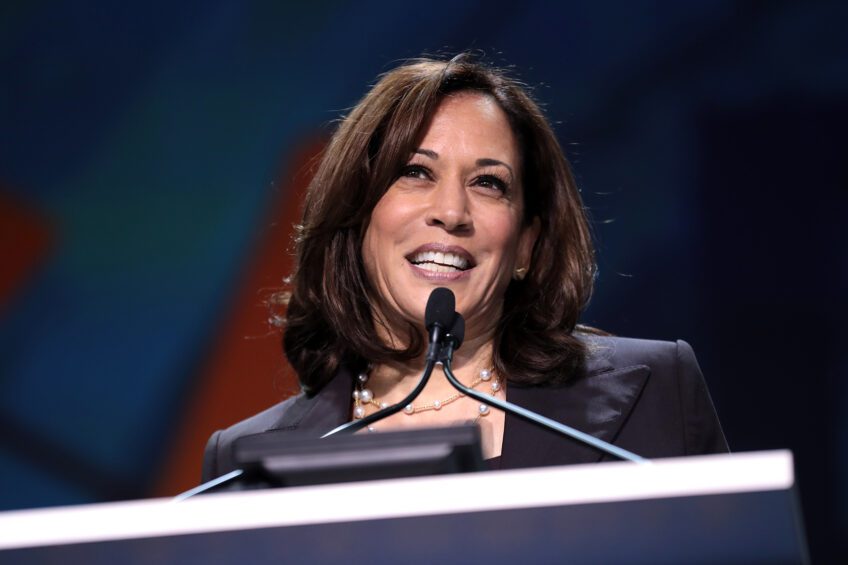What’s possible under Healey administration?
Activists see opportunities for change

At the Fairmont Copley Plaza election night party where the Democratic victors at the top of the ticket gathered, the mood was high. For the first time in Massachusetts history, women will occupy five of the six constitutional offices. Former City Council President Andrea Campbell became the first Black woman elected to statewide office. And for the first time in eight years, a Democrat will sit in the governor’s office.
Between speeches from Governor-elect Maura Healey, Lieutenant Governor-elect Kim Driscoll and Attorney General-elect Andrea Campbell, 12th Baptist Church Pastor Willie Broderick paused to take stock of the victories.
“It’s exciting to see the shifting landscape of Massachusetts politics,” Broderick said. “It’s very promising for the future of the commonwealth.”
A few blocks away, at the Colonnade Hotel, activists with labor and community-based organizations were celebrating the passage of Ballot Questions 1 and 4. Question 1, the Fair Share Amendment, promises to raise more than $1 billion a year for public education and state transportation projects.
With a new gubernatorial administration comes the promise of new priorities for state government, and with the passage of the so-called millionaires tax, the promise of funding to make things happen.
“We hope this creates more opportunity, particularly for communities of color,” Broderick said. “We really hope to see access open up for so many people.”
On the campaign trail and in the days after her victory, Healey has been light on details of policies she would implement as governor. Asked by reporters following a meeting with outgoing Governor Charlie Baker how her administration would differ from his, the 5’4” attorney general said, “The microphones are going to be a little lower. There you go. And the rest, we’ll see.”
But activists, elected officials and others with a stake in state government have high hopes for the next four years.
“It’s going to be very different having a starting lineup with all women,” said 2nd Suffolk District Senator-elect Liz Miranda. “I’m excited about working with them on Beacon Hill.”
Miranda said she is hoping the Legislature will prioritize policies that help close the racial wealth gap and continue the work of criminal justice reform that has advanced over the last three years. Without the threat of a veto from a Republican governor, Miranda says, the Legislature may be empowered to make bold progressive changes.
“I think in this legislative session that’s coming up, we’re going to hit the ground running,” she said.
Education activists are looking to the revenue from the Fair Share Amendment tax to fully fund the Student Opportunity Act, which Healey pledged to do on her campaign website. The Student Opportunity Act would channel hundreds of millions of dollars into districts serving low-income students. Boston Teachers Union President Jessica Tang says she’s hoping some of that funding finds its way to Boston, where the Boston Public Schools have increased spending on school psychologists, special education programming, reading specialists and other much-needed positions.
“We need to sustain the changes that came with ESSER funds,” she said, referring to the federal Elementary and Secondary School Emergency Relief funding that Boston and other districts received during the pandemic. “We were going to potentially lose these needed positions if there wasn’t a new funding sourced to sustain them.”
Tang and other BTU members have been advocating for more special education teachers to help the district create more inclusion classrooms, where students with special needs are educated alongside regular education students. Such classrooms require additional staff — specialists who can help special needs students while the classroom teacher delivers instruction.
“It will require more positions in order for students to get everything they need,” Tang said.
NAACP Boston Branch President Tanisha Sullivan said activists may have to keep pressure on the Legislature to ensure that funding from the Fair Share Amendment actually makes it to the two areas written into the ballot question: public education and transportation.
“The Legislature doesn’t have to do anything,” she said, noting that lawmakers signed the Student Opportunity Act into law in 2019 but have yet to fully fund the measure.
State Rep. Russell Holmes, whose district includes Mattapan and sections of Dorchester and Roxbury, said he’s hoping the funding from the Fair Share Amendment will give Healey and the Legislature the funds necessary to support the MBTA, which has seen service delays and interruptions over the last seven years.
Holmes also is hoping Boston’s schools fare better under Healey than they did under the Baker administration. Noting the sometimes rocky relationship between Mayor Michelle Wu and Baker and officials in his administration, Holmes says Healey may bring a welcome change.
“They’re two women who are the first in their positions,” he said. “You would expect that Michelle will have a much better relationship with Healey.”
Ultimately, Healey’s success as governor may depend on her working relationship with lawmakers. The last Democratic governor, Deval Patrick, often had friction with House and Senate leadership, undermining many of his policy initiatives, which he sought to advance without the support of those with the power to fund them.
“The Baker administration built an effective, bipartisan relationship with the Legislature,” Sullivan said. “Expectations will be high for the Healey administration to have an even more effective relationship with the Legislature to help improve the quality of life for Massachusetts residents.”





